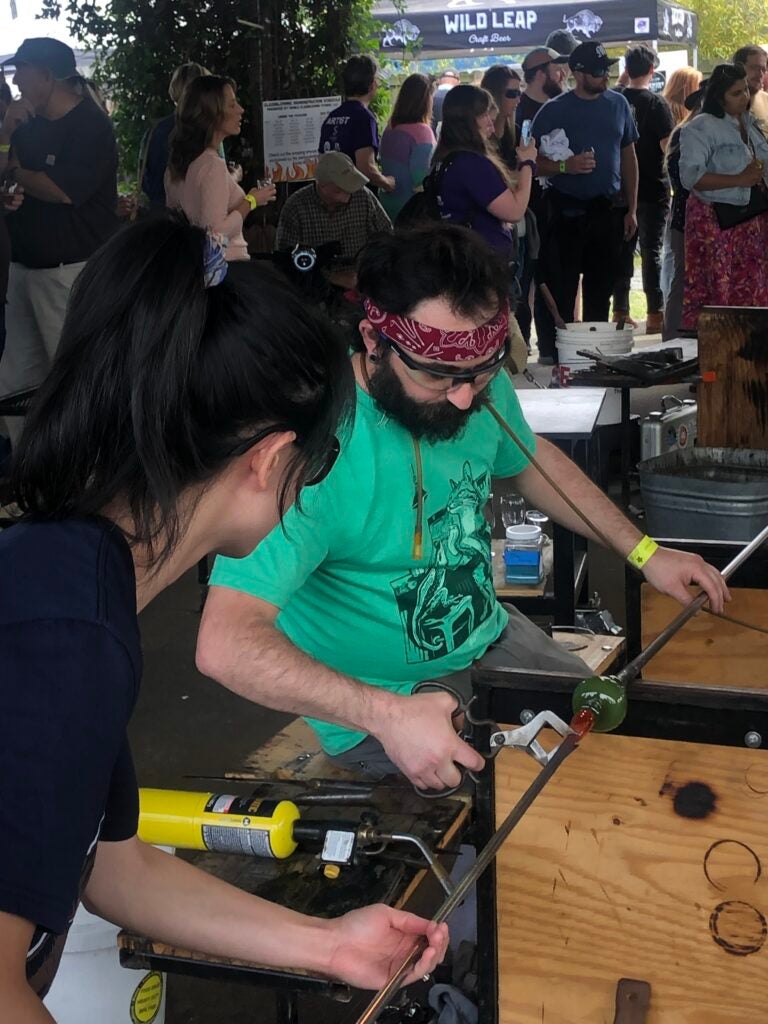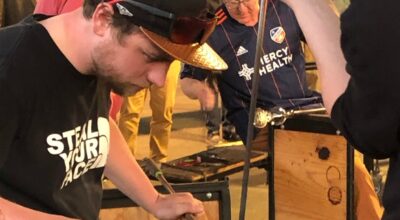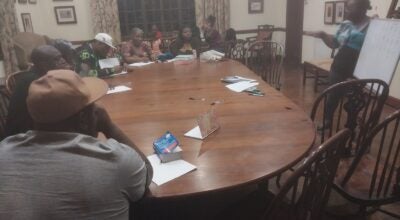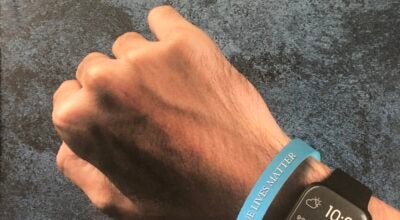Hot Glass and Craft Beer Festival
Published 8:04 pm Monday, April 8, 2024

- Yen-ting (left) and Bryan (right) Beck, with Startup Studios, making a cake platter.
The Hot Glass and Craft Beer Festival, one of the biggest events orchestrated by Mainstreet, was held April 6th. The sky was bright, with a few cool breezes the only remanent of the late season chill that had previously dogged the town. A band played under a tent on a closed off section of North Hampton Street, with Pat Spann, owner of Pat’s place, one of the musicians.
Attendees were given shot glasses, with flecks of color in the V.I.P glasses and a more standard label for regular admittance. Tents with volunteers distributing a variety of beer brands including Pretoria, Creature Comforts Brewing Co., Parish Brewing Co, and others had sprung up around the Lenny’s Farmer’s Market pavilion.
Patrick Owen was in charge of the music, with Pat’s Bluegrass, Evergreen Bluegrass, and Pickled Holler performing. The pavilion also sheltered several mobile glass furnaces. Husband-and-wife duo Yen-ting Beck and Bryan Beck with Startup Studios have come to the Festival for six years. Together they demonstrated how to make a cake platter.
Bryan Beck started with the stem, working it on the end of his blow pipe and reheating in the furnace it repeatedly. Afterward he worked a large globular piece, rolling it back and forth and shaping it with a moist wad of paper as he twirled the blow pipe to maintain symmetry. Yen-ting Beck brought the stem back, while he used a torch to keep the bulbous globe molten. They carefully combined the two using a stand, rolling their blow pipes in tandem. The large bulb was opened and flattened, making a greenish surface for the cake platter. Afterward they placed the piece in an annealer which, while 900 degrees, still allows the piece to cool safely to prepare it for room temperature.
Afterward, Bryan Beck told how he got into glass working. “I was doing nothing much, and I met a glass blower when I was on a trip with some friends.” He and his wife have been working together for a decade. He talked about a recently commissioned sculpture they had done for a wine bar in Macon, along with pendant lights.
Most of his time is spent in the studio teaching and creating pieces to sell in their gallery. He talked about the most challenging aspect of learning to blow glass. “Learning how to fail and being okay with it. You learn how to fail, and you can learn what to do right the next time.”
GSW Senior Emily Larkey and exchange student Will Pridgeon made a glass fish at the small college furnace. Afterward, Larkey shared what led her to glass blowing. “I came to GSW for photography and then I found myself taking a glass blowing class, and then I fell in love with it, and I’ve been doing it for three years, and I’m about to graduate with a career in glass blowing, so it’s been great.”
She talked about the sculptures she makes. “So far I’m doing fishes and angels. I want to capture my Christian faith in my artwork, so I’m doing lots of religious artwork within that.”
Larkey detailed her career. “Right now I currently work for Hot Glass Academy and Mobile Glass, both in Americus Georgia, so it’s been a lot of fun getting to learn both of the industries, and how to make the furnaces and how to make the glass.”
Larkey talked about Hot Glass Academy’s mission. “So Hot Glass Academy, we do lots of production-based work. We do lots of road shows, we travel around and teach people about glass.”
She told how Mobile Glass makes the Academy’s work possible. “They make the furnaces so that Hot Glass Academy and other business can travel and do glass blowing and teach people the knowledge they are learning from today and any other event that we do.”
Larkey encouraged others to experiment with glass blowing. “I would suggest if you have an opportunity, take a class, learn how to do some glass, it’s a lot of fun. It’s a skill that not a lot of people know.”
Chuck Wells has been teaching glass blowing at Georgia Southwestern for 21 years, which has the only glass blowing program in the State. He told how he recently retired from Mobile Glass, which is run by Phil Vinson, the organizer of the Hot Glass festival. He told how the company has revolutionized the industry. “They build furnaces and ship them all over the world. They just got back from Kuwait. There’s a furnace in India, there’s a furnace in Turkey.”
Wells described how a company that blossomed out of an art program in Americus Georgia had a global effect on the industry. “Up until this point, eight or nine years ago, there was nobody manufacturing small furnaces, they had all gotten really large. A lot of them were institutionalized by universities, and museums might have the money to purchase a big furnace and run a big program, but there wasn’t anything for the artists to take home and use hardly, unless they built it themselves, which isn’t feasible for a lot of people. So mobile glass really opened the pandora’s box of where you could melt glass and express yourself with that material.”
He mentioned that two former GSW students were featured on a Netflix show called Blown Away, and that the program’s graduates were in high demand. “Every one of them that wants to work in glass can get a job when they graduate, in glass, and they do.”






